Legal Cheek’s annual conference gathered together key figures from across the profession to discuss GenZ, SQE, apprenticeships, skills gaps and more
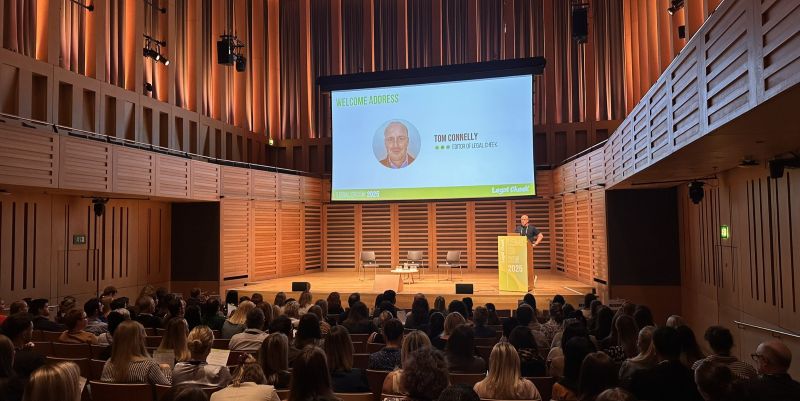
Yesterday, LegalEdCon 2025 returned to Kings Place in London for talks exploring the hottest topics in legal education and training.
Nearly 300 delegates gathered to hear the latest industry insights from leading experts in the legal field. This year’s conference featured sessions on a variety of topics, including the practical developments in the Solicitors Qualifying Exam (SQE) regime, diversity, intergenerational workplaces, the science behind learning, and solicitor apprenticeships.
Thom Brooks returned with insights and laughs for the keynote session, continuing his analogy between the SQE and Brexit. His emphasis on reform and improvement to better the SQE for students, providers, and firms capped off the fascinating and poignant themes covered over the day.
Session 1: Mind the gap: tackling workplace readiness
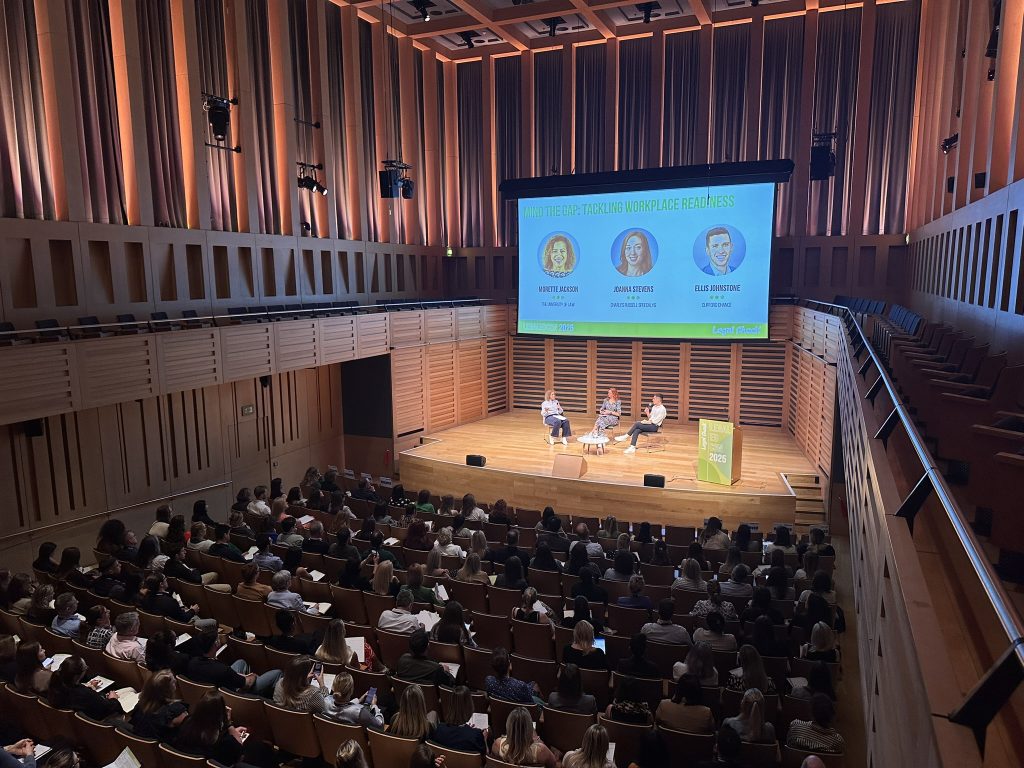
The speakers:
- Morette Jackson, Director of Business Development at The University of Law (chair)
- Joanna Stevens, Senior Early Talent Manager at Charles Russell Speechlys
- Ellis Johnstone, Early Talent Development Lead at Clifford Chance
ULaw’s Morette Jackson, Director of Business Development, kicked off LegalEdCon 2025 by chairing a session focused on workplace readiness. The session asked important questions about how equipped incoming trainee solicitors are for life at a law firm. Jackson spoke about her experience in education before turning to a survey conducted by Legal Cheek. The survey statistics and comments led to a rich discussion with graduate recruiters Joanna Stevens of Charles Russell Speechlys and Ellis Johnstone of Clifford Chance about how their firms are tackling workplace readiness, accounting for the SQE, Covid graduates and generational differences.
Jackson left the lecturn to join her co-speakers on stage for a roundtable Q&A. Joanna Stevens discussed how Charles Russell Speechlys build workplace readiness using their business school. Stevens added that LPC graduates were not required to take SQE2 when joining the firm, but flagged that SQE resits have been disruptive. Apprentices, meanwhile, were praised for their enthusiasm, drive, proactivity, and good exam results — and more exposure to workplace norms.
As Ellis Johnstone said, “law firms now have four generations under one roof”. He noted that some trainees in Clifford Chance’s pipeline had never in their lives taken an exam in-person thanks to Covid, coursework and hybrid working — requiring new pastoral strategies from Johnstone and his team. He noted that setting expectations was key to bridging generational divides.
You can read more about the Legal Cheek workplace-readiness survey here.
Session 2: The psychology of learning
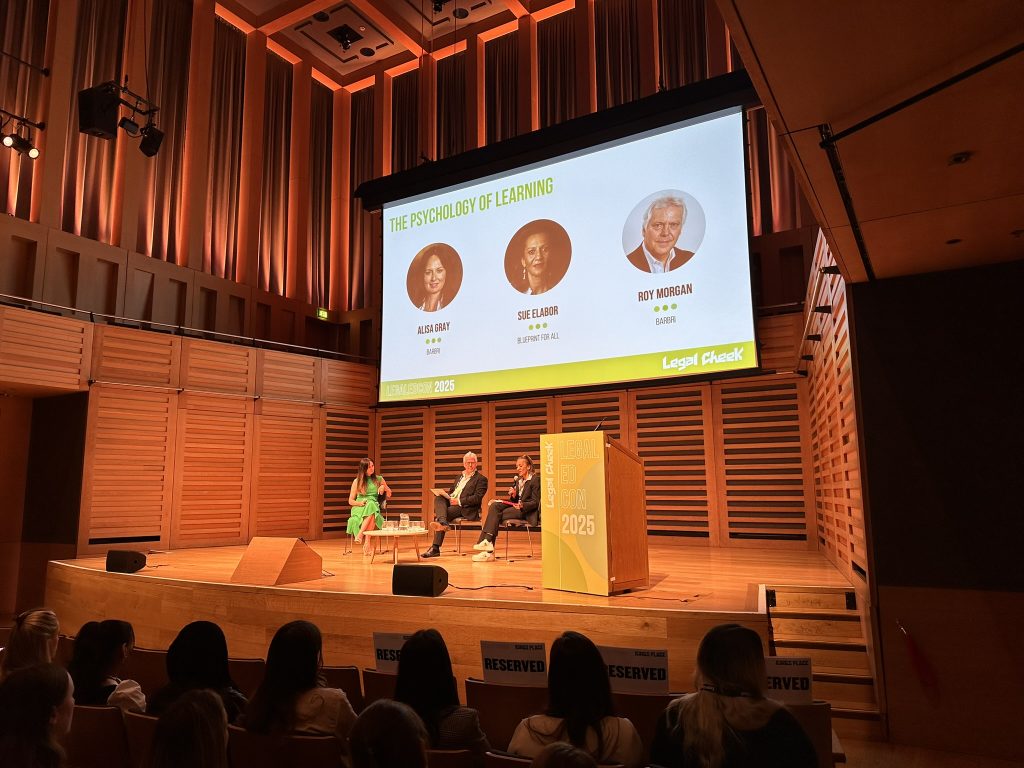
The speakers:
- Alisa Gray, Director of Learning at BARBRI (chair)
- Roy Morgan, Training & Design Specialist at BARBRI
- Sue Elabor, Organisational Psychologist at Blueprint For All
Alisa Gray, Director of Learning at BARBRI, chaired the psychology of learning session. This dynamic discussion explored how neuroscience and psychology are shaping modern legal education. Joined by BARBRI colleague Roy Morgan and Sue Elabor of social justice charity Blueprint for All, the panel explained how learning actually works — and how legal educators can make what they’re teaching stick. Gray, a qualified lawyer turned organisational psychologist, introduced the session by challenging attendees to think of learning as “rewiring the brain”.
Roy Morgan reflected on how digital learning has put “everyone in the front row” of the class. He described BARBRI’s use of guessing, spaced repetition, and chunking knowledge in bite-sized pieces to foster long-term knowledge — crucial for SQE prep, but also for lifelong learning.
Sue Elabor emphasised context, particularly for students from socially mobile backgrounds. She highlighted how MCQs can disadvantage learners unfamiliar with culturally-loaded scenarios, and that psychological safety — the ability to make mistakes without fear — is key to encouraging growth. On fostering learning mindsets across age groups and generations, she said: you certainly can teach an old dog new tricks as long as the attitude is right.
The panellists explored attention spans, busting the myth that they’re getting shorter. Instead, they stressed the need to make content engaging and relevant. The session closed with a call for science-informed teaching to improve educational outcomes. Morgan reminded the audience: “it’s not about what we teach — it’s what learners actually take in.”
Session 3: Gen Z: expectations and realities
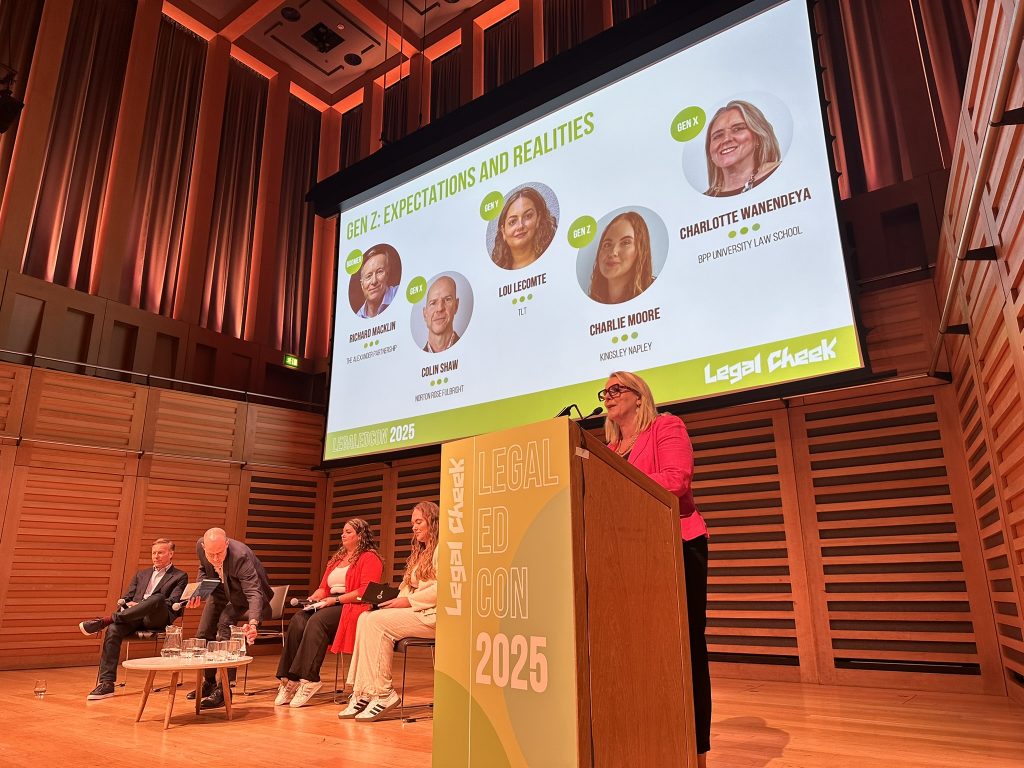
The speakers:
- Charlotte Wanendeya, Head of Law at BPP (chair)
- Richard Macklin, Former Global Vice Chair at Dentons
- Charlie Moore, Senior Paralegal at Kingsley Napley
- Lou Lecomte, Solicitor Apprentice at TLT
- Colin Shaw, Head of Learning and Development (EMEA) at Norton Rose Fulbright
Charlotte Wanendeya, Head of Law at BPP, chaired a conversation featuring representatives from four generations of legal professionals: Baby Boomer Richard Macklin, Gen Xers Colin Shaw and Wanendeya herself, Millennial Lou Lecomte, and Gen Z Charlie Moore. The panel tackled evolving attitudes towards mental health, hybrid working, pay expectations, and AI.
Moore called for mental health support to be embedded into the culture of law firms, especially to support those from lower-income backgrounds. Lecomte agreed, adding that as well as mental health, Millennials value career transparency and direction. Macklin reflected on a past where anxiety and his recently-diagnosed ADHD were not spoken about, urging law firms to combine support with self-care: “Law is a tough job. Like athletes, lawyers need to stay fit and supported.”
On hybrid working, the panel agreed that firms must adapt to new learning models and embrace change. Shaw said post-pandemic realities call for intentional support and digital inclusion. Though learning “by osmosis” was still important, Macklin stressed that “availability” trumps physical presence.
The discussion also explored salaries. Moore challenged the “golden handcuff” model, saying Gen Z prioritised meaningful work over hierarchy — which Lecomte echoed. Wanendeya noted that fewer of today’s young lawyers are seeking partnership at their firms as ideas of success have changed, meaning law firm models may have to evolve. Macklin pointed out that junior lawyer salaries are much higher than they have ever been in the past, making law a difficult but a well-remunerated job. This seemed to cut to the biggest generational split.
The speakers emphasised interpersonal skills, critical thinking, and collaboration across generations — including in the ways they use tech. Macklin closed by warning: “If you’re not using GenAI in your work today, I’d be worried” but noted that emotional intelligence is a horizontal — not vertical — spectrum, and that every generation has something to learn from the others.
Lunch and networking
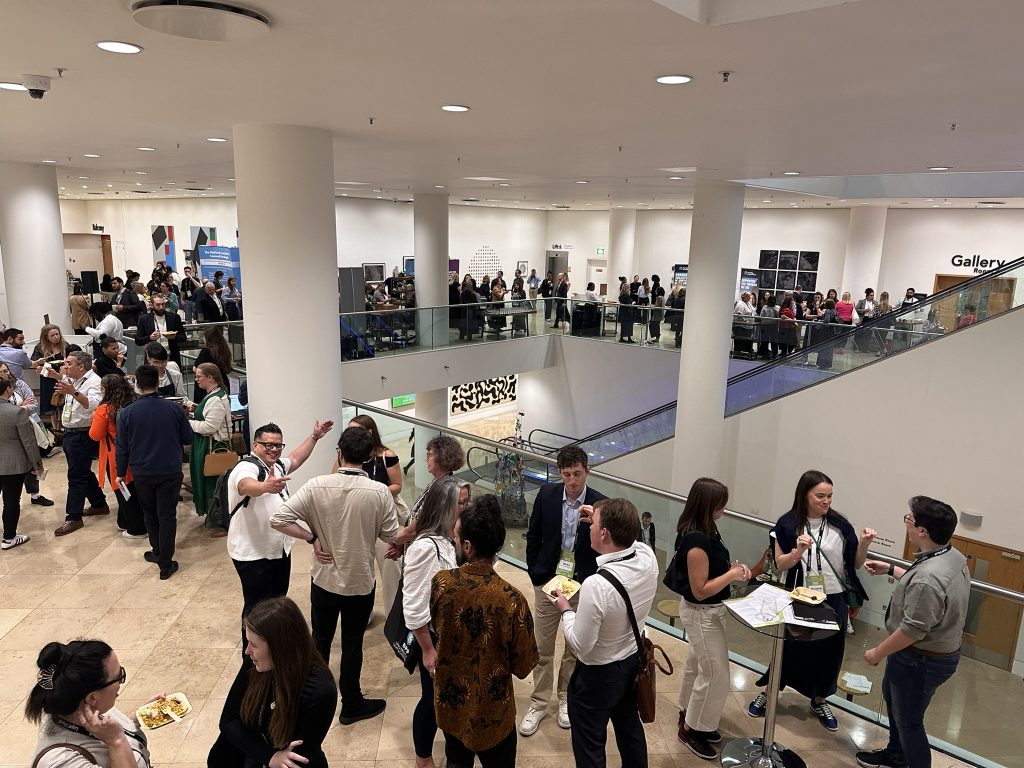
Session 4: The SQE unfiltered

The speakers:
- Caroline Lister, Director of Client Partnerships at BPP
- Professor Joanna Ballard, Deputy Vice-Chancellor, Academic at The University of Law
- Jonathan Worrell, Director of Business Development at BARBRI
- Daisy Mortimer, Senior Future Talent Manager at Stephenson Harwood
- George McNeilly, Early Talent Partner at DWF
- Julie Swan, Director of Education and Training at the Solicitors Regulation Authority (SRA)
- Danielle Viall, General Counsel at Legal Services Board (LSB)
Chaired by Legal Cheek publisher Alex Aldridge, the first session after lunch promised to “air” the big questions on the SQE in an unfiltered roundtable. The session covered everything from data (or lack thereof), shifts in law firm recruitment, and how training providers view on the SQE’s benefits and drawbacks.
Some pertinent questions were put to the SRA’s director of education and training Julie Swann on topics including promised data on provider pass-rates, diversity issues and an overall lack confidence in the SQE. Danielle Viall from the LSB in particular mentioned the “red” rating they gave the SRA when it failed to publish SQE data in full.
Law firm representatives explained how taking on SQE trainees has changed their day-to-day work. George McNeilly from DWF mentioned how the firm works closely with law schools to support neurodiverse candidates and those with protected characteristics. Daisy Mortimer of Stephenson Harwood said disruptions due to SQE failures — which are much more common than failures on the LPC — have impacted the recruitment pipeline for firms. She recalled having to tell departments that they wouldn’t have an incoming trainee on very short notice.
ULaw’s Joanna Ballard celebrated the diversity in courses available to candidates but noted that the introduction of the SQE has made it necessary to design entirely new platforms and systems. Jonathan Worrell mentioned that BARBRI offers client-firms live data to review their future-trainees’ ongoing attainment and offer targeted coaching. The SQE has fallen short for self-funding students suggested BPP’s Caroline Lister, who noted this may limit the diversity of firm trainee intakes.
Questions from audience members covered the impact of the SQE on neurodiverse candidates, praised the SQE’s “earn while you learn” qualifying work experience and the SQE access and reinvestment fund.
Session 5: Diversity meets politics

The speakers:
- Giles Proctor, CEO & Head of School at The College of Legal Practice
- Tom Wicksteed, Early Careers Manager at Mishcon de Reya
- Amia Tahir, Solicitor Apprentice at Dentons
- Danielle Lobel-Weiss, Partner at Lee & Thompson
Legal Cheek publisher Alex Aldridge chaired a discussion on how government policy is shaping law firm strategy — particularly around DEI and the uncertainty surrounding funding for Level 7 solicitor apprenticeships.
Giles Proctor, CEO & Head of School at the College of Legal Practice, noted the current uncertainty around apprenticeships but stressed that education providers were preparing for all outcomes. Tom Wicksteed clarified that for certain firms — who only offer school leaver apprenticeships — level 7 funding cuts are not a stressor.
On DEI and President Trump, there was discussion about how government policy can cause seismic shifts for both legal education, graduate recruitment, and law firm strategy.
Solicitor apprentice Amia Tahir shared her inspiring story of choosing a solicitor apprenticeship at Dentons over an offer from the University of Cambridge, praising the apprenticeship model for enabling students from disadvantaged backgrounds to “earn while they learn.” She told the audience that she is now the most highly educated person in her family and earns more than friends still at law school: “I’ve broken the cycle.”
Lee & Thompson partner Danielle Lobel-Weiss celebrated how apprenticeship schemes were enhancing DEI and facilitating on-the-job training for boutique firms. However, she acknowledged that some partners underestimate what apprenticeships involve.
Concerns remained about the need for better outreach programmes to help apprenticeship candidates understand the culture of law firms. Nevertheless, the panel agreed the apprenticeship standard is as high as that for training contract candidates and firms who had not yet adopted the scheme were strongly encouraged too.
Keynote – The SQE is like Brexit: seven years on from his prophetic talk at the inaugural LegalEdCon, Thom Brooks returns with a plan to reform the SQE
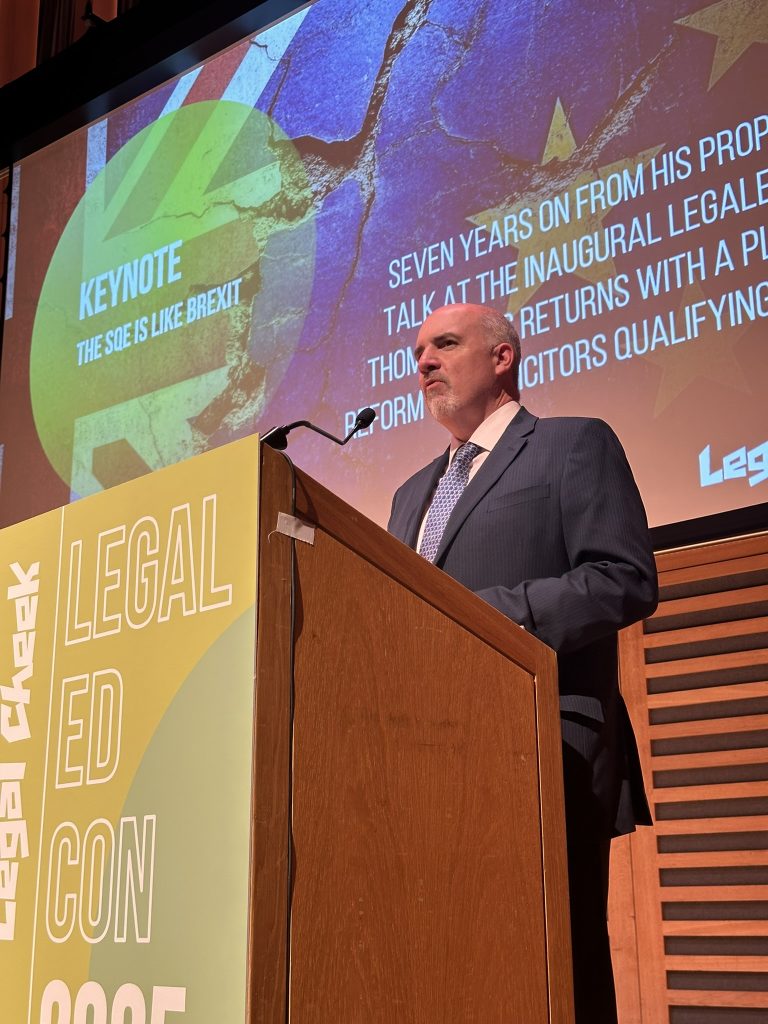
The speaker:
- Thom Brooks, Professor of Law and Government at Durham University
Thom Brooks, Professor of Law and Government at Durham University, returned to LegalEdCon for a follow-up to his SQE “TEDtalk” — from all the way back in 2018, at the inaugural conference. A self-proclaimed big Legal Cheek fan, Thom brought great energy to wrap up the conference.
“It struck me in 2018 that things going on with Brexit and with the SQE were similar,” Brooks said, before catching the crowd up on his thoughts. To much chuckling from the audience, he recalled that back then “folks were told the SQE would create better candidates, be a cheaper route to qualification, and be more inclusive — with the data to back it up.”
Drawing an analogy with Brexit, Brooks suggested a lot was said about the SQE — but not a lot that explained what the SQE actually was: “SQE means…SQE,” he said, in his best Theresa May impression.
Picking up on key themes from across LegalEdCon 2025 — diversity, data (or lack thereof), and attainment gaps — Brooks did not hold back in his assessment of these exams. He then asked the pressing question — is it time to stop bashing the SQE?
Brooks set out ten “good ideas” he had drawn from advisory board which included law firms, academics, and recent SQE-takers. These ideas included SQE1 exemptions for law graduates, more northern test centres (or “at least one within 2 hours of Durham!”) and greater transparency on pass-rate data. The delegates, from regulators to academics to law firm recruiters, were hastily taking notes.
Brooks’ funny yet insightful keynote speech made for an outstanding finish to a fascinating LegalEdCon 2025.
Tom Connelly, Legal Cheek‘s editor, brought the conference to a close by thanking the speakers, delegates and headline sponsors BARBRI, BPP University Law School and The University of Law, as well as silver sponsor The College of Legal Practice and additional sponsors Oxford University Press, The National Association of Licensed Paralegals, The Food Chain and Support Through Court.